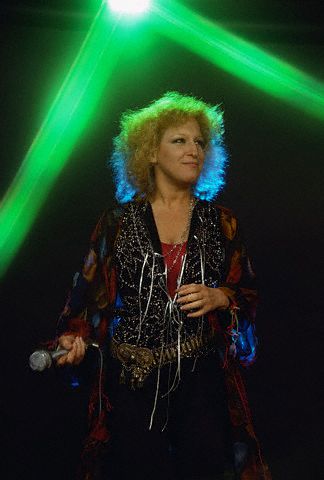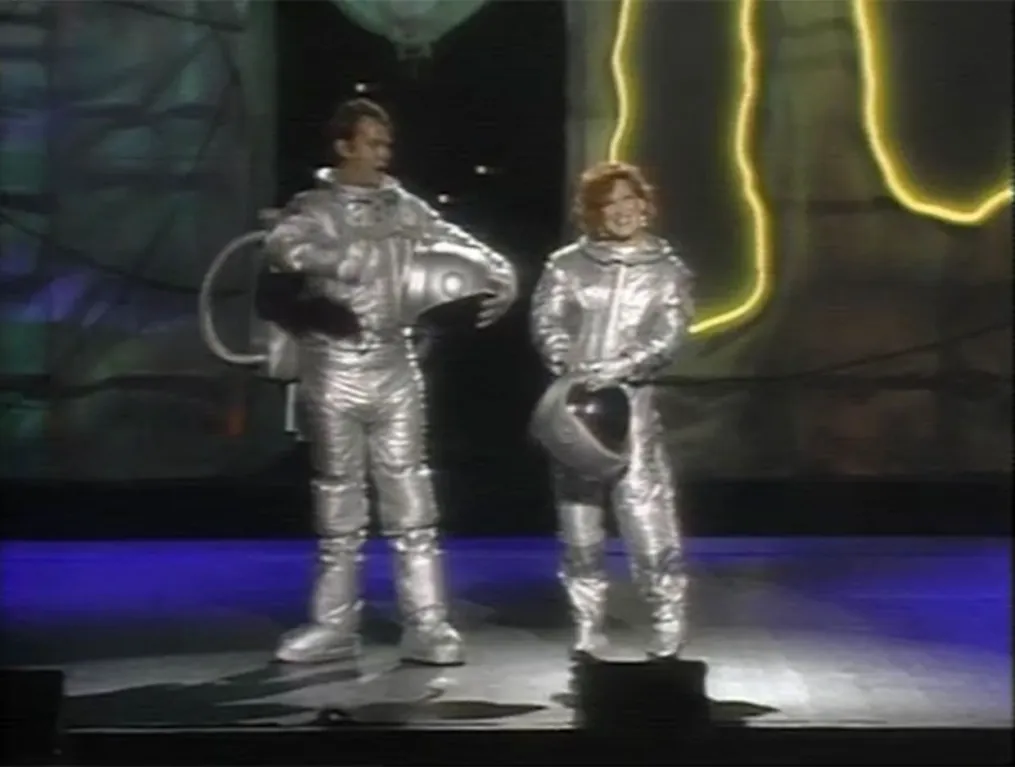
By Michael Ventre
MSNBC contributor
July 12, 2004
Photo: Douglas Kirkland
The effort to make it in the music world is rarely harmonious. There are countless indignities. Artists start out by performing in smoky clubs with obnoxious drunken patrons and obese bouncers who smell. They also have to charm the snakes who represent the record companies, hoping to get their financial backing to cut a single that will wind up getting little airplay and no advertising.
After that, there are disc jockeys who accept payola, and slimy managers who sign performers to contracts that include hidden clauses in tiny print, and crooked concert promoters, and insincere groupies, and inconsiderate roadies, and parasitic variety show producers, and all sorts of other traps designed to ruin the musical genius before he or she ever sees a moment of fame or a dime of profit.
Yet there are a select few who break through and triumph. And do they take the time to savor their hard-earned success? Heck no. As soon as they feel safely established in the music business, they start to dream of acting glory. Some people are never satisfied.
Will Smith, who stars this week in “I, Robot,” began as a rapper, then became “The Fresh Prince of Bel Air” before moving on to feature film success. Many others have come before and after him. Not all have been as fortunate.
There is no real formula for paydirt in the transition from music to acting. It depends mostly on individual talent and drive, mixed with the occasional stroke of fortune — good or bad — beyond one’s control. What is constant, however, is the lure. No matter how ill-suited a star in music appears to be for an acting career, an irresistible force somehow pulls he or she toward it.
Sometimes the results can be quite impressive. But then there are other situations when you just wish someone would have smacked that person upside the head with a microphone stand.
The following are examples of individuals who have established themselves in music and then crossed over into acting, broken down into the 10 best and the 10 worst. Certainly these will be open to debate. I guarantee that waves of suggestions will follow regarding candidates for inclusion on either list. These are just the ones that come to mind after a highly subjective gaze at history.
In most cases, the ones who succeeded did so because they played characters close to their own personalities, and audiences liked those personalities. As for the ones that didn’t quite work out, let’s just say that fans are not eager to see them stretch and try something different as actors when acting like themselves was itself a stretch:
The Best
Cher: She hasn’t done a film in five years, since “Tea With Mussolini,” but early in her acting days Sonny Bono’s former muse gained kudos and respect for her work in “Come Back to the Five and Dime, Jimmy Dean, Jimmy Dean,” “Silkwood” and “Mask.” Then she solidified her place in history with a Best Actress Oscar in “Moonstruck.” At that juncture in time, her career priorities officially became movies first, music second.
Kris Kristofferson: The former Rhodes Scholar, Army captain and helicopter pilot began writing songs for Johnny Cash, then he himself became a country balladeer. In 1971, he began acting and now has more than 80 film and TV roles to his credit, most notably in “The Sailor Who Fell From Grace With The Sea,” “A Star is Born” and “Semi-Tough.” He hit a huge pothole in 1980 by appearing in “Heaven’s Gate,” Michael Cimino’s epic bomb, but has enjoyed a career renaissance recently.
Frank Sinatra: Of course, Old Blue Eyes made his bones coaxing tears out of the eyes of bobbysoxers. But his acting credits are extensive. Most people know he won an Academy Award for Best Supporting Actor in 1953’s “From Here to Eternity,” but forget he also was nominated in the Best Actor category two years later for “The Man With the Golden Arm.” After that, he had a slew of parts, most of them crammed in the 1960s, topped by “The Manchurian Candidate.”
Burl Ives: It’s hard to say which came first for him, music or acting, because he did a little of both early on. But he became famous as a folk singer in the ’40s and ’50s, and went on to record 42 albums. Between singing gigs, he acted on stage and in films. He is perhaps best known for playing Big Daddy in the 1958 film version of Tennessee Williams’ “Cat on a Hot Tin Roof,” starring Paul Newman and Elizabeth Taylor. He also became part of a Christmas tradition as the voice of Sam the Snowman for “Rudolph, the Red-Nosed Reindeer.”
Barbra Streisand: Babs got her first break in 1962, a part in a Broadway show called “I Can Get It For You Wholesale.” That led to her breakout first album in 1963, then a two-year Broadway run in “Funny Girl,” then the movie version of the show, for which she won a Best Actress Oscar, and she hasn’t looked back since. She is the first person to win a Grammy, Emmy, Oscar and Tony, although the Tony came in a noncompetitive category. She is also an accomplished director.
Elvis Presley: The King became a music sensation in the mid 1950s by bringing black rhythm and blues to white audiences. Then he accomplished another type of crossover by appearing in 31 films, mostly light romantic fare with plenty of singing. Most were popular with audiences, although as an actor he was never confused with Laurence Olivier or Marlon Brando. “King Creole” in 1958 was probably his most critically acclaimed role.
Bette Midler: The Divine Miss M has a glowing list of acting credits, having appeared in successful Hollywood releases like “Ruthless People,” “Outrageous Fortune” and “Beaches.” Her first starring role was in 1979’s “The Rose,” for which she received an Academy Award nomination. Although most of her parts tended to be on the broader side of comedy, she projects serious movie star charisma in everything she does. Not too shabby for someone who started out singing in gay bathhouses.
Dwight Yoakam: He established himself as a country music star in the mid 1980s, but his first love was acting, going back to his high school days in Ohio. So after his record sales began to take off, he branched out into movies. His big screen debut came in 1992 in the crime thriller, “Red Rock West,” and he has been working ever since. He gained particular attention by playing bad guy Doyle opposite Billy Bob Thornton in “Sling Blade.” Yoakam continues to mix both acting and music with equal success.
Queen Latifah: It’s hard to think of her as the First Lady of Rap anymore, because she has enjoyed so much acclaim in the movies. But that’s where she began in the late 1980s, a vibrant and respected female voice in a genre populated mostly by angry males. Her first part came in Spike Lee’s “Jungle Fever” in 1991 and she has since distinguished herself in “Set It Off,” “The Bone Collector” and “Bringing Down the House.” She received an Academy Award nomination for her turn as prison matron Mama in “Chicago.”
Mark Wahlberg: Brother Donnie, of New Kids on the Block, helped Mark establish himself musically as the rapping Marky Mark. Spates of rambunctious behavior and some inflammatory comments about gays hurt his music career. So he discarded the Marky Mark persona and tried acting. His first film role came in “Renaissance Man,” and he later received kudos for his work in “The Basketball Diaries,” “Fear,” “Boogie Nights” and “Three Kings.” Critics and audiences like him enough to forgive his troubled youth and his time as an underwear model.
Honorable mentions: Will Smith, Dolly Parton, Steve Van Zandt, Ice T, Ice Cube, Tom Waits, Donnie Wahlberg, Lyle Lovett, Harry Connick Jr., Mandy Moore, Snoop Dogg, Bing Crosby, Diana Ross, Mos Def, Olivia Newton-John, Gwen Stefani.
The Worst
Mariah Carey: She is a marginally talented singer to begin with, but at least she managed to establish herself in that realm with 15 No. 1 hits and sales of more than 125 million records worldwide. But then came “Glitter” in 2001 and the question: “What was she thinking?” It was a cringe-inducing vanity project about a singer dreaming of being a star. She should have to pay a fine and do community service for this.
Britney Spears: Another manufactured celebrity singer seeking respect in Hollywood, Britney appeared in a universally derided piece of disposable celluloid two years ago called “Crossroads,” in which she played one of three young ladies who go on the road to find the true meaning of friendship. Along the way, they encounter a bad script, lousy acting, poor direction and numerous hints that maybe she should stick to soda commercials and quickie marriages.
Jennifer Lopez: It may not seem fair to include her here, because she has acting talent. In 1998, she sparkled in Steven Soderbergh’s “Out of Sight,” opposite George Clooney. But before she gave herself a chance to become established as an actress of consequence, she embraced mega-celebrity and began making awful choices. Now it’s hard to take her seriously. “Angel Eyes,” “Enough,” “Maid in Manhattan” and, of course, “Gigli” – not to mention her high-profile personal life — have ruined any chance she once had at acting prominence.
Paul Simon: He’s a magnificent singer-songwriter. And he was enjoyable as the smarmy music producer Tony Lacey in “Annie Hall.” But then came his leading role as Jonah in the 1980 big-screen release, “One Trick Pony.” If it were only an exercise in narcissism, it would have been O.K. But it was much worse, and so was he. His acting career then said, “Like a bridge over troubled water, I will lay me down.” On the bright side, less time acting means more time making music.
Madonna: The Material Girl received passable grades in “Desperately Seeking Susan” and “Dick Tracy.” But she is observed here for her entire body of work. The Razzies, which dishonor the worst Hollywood films and performances, has bestowed 15 nominations and nine awards on her throughout her career. When you consider longevity, then Madonna rules. She has embarrassed herself on the silver screen with colossal stinkers in three decades — “Shanghai Surprise” (1986), “Body of Evidence” (1993) and “Swept Away” (2002).
Shaquille O’Neal: I know, I know. He established himself as a basketball player first. But along the way, in a meeting with his team of handlers, somebody must have come up with the bright idea to let him rap. His first two albums sold more than a half-million copies each. That must have emboldened the same idiot to suggest that Shaq try acting. In 1994’s “Blue Chips,” at least he wasn’t the lead. In “Kazaam” and “Steel,” the public was not so lucky. Although it does help some that he is about to be traded from Los Angeles, the entertainment capitol of the world, to Miami, it is still possible that he can gain access to a movie camera.
Whitney Houston: As a singer, Whitney has few equals. But when she caught the acting bug, she should have rested and taken plenty of fluids instead of giving in to it. Two particularly poor performances come to mind in “The Bodyguard” and “The Preacher’s Wife.” She is also hampered by a troubled personal life. Her bizarre exploits with husband Bobby Brown have damaged her reputation and made it unlikely she’ll get hired again anytime soon in Hollywood.
Rick Springfield: He began as a musician in Australian metal bands and toiled unsuccessfully for years. While he pursued his rock star dream, he took bit acting parts in American TV shows, eventually becoming a sensation as Dr. Noah Drake on “General Hospital.” What followed was a rapid ascent and a quick decline. He had a No. 1 hit with “Jessie’s Girl,” then tried a feature film career. In 1984, his first movie role was in “Hard to Hold,” which had the same effect on his career as “Glitter” had on Mariah Carey’s.
Ringo Starr: He was a replacement drummer who became the comic-relief Beatle. But then he transitioned into the comic-relief actor, and that wasn’t quite as funny. He is a lovable character, but acting is not his strong suit. If he needed money, he should have just sold off a bunch of memorabilia rather than take parts in flops like “The Magic Christian” and “Caveman.” He must have gotten the message, because he hasn’t taken an acting role in about 15 years.
Eddie Fisher: He was one of the hottest singers of the 1950s and married to Debbie Reynolds. He would later describe himself at that time as “bigger than the Beatles, bigger than Elvis, hotter than Sinatra.” With such a built-in popular audience, he was a prime crossover candidate. But he starred in exactly two movies. The first was “Bundle of Joy,” an instantly forgettable musical in 1956 with then-wife Debbie Reynolds. Not long after, his affair with Elizabeth Taylor was revealed. He starred with Taylor in “Butterfield 8” in 1960. Neither picture was a hit, and it was all downhill from there.






